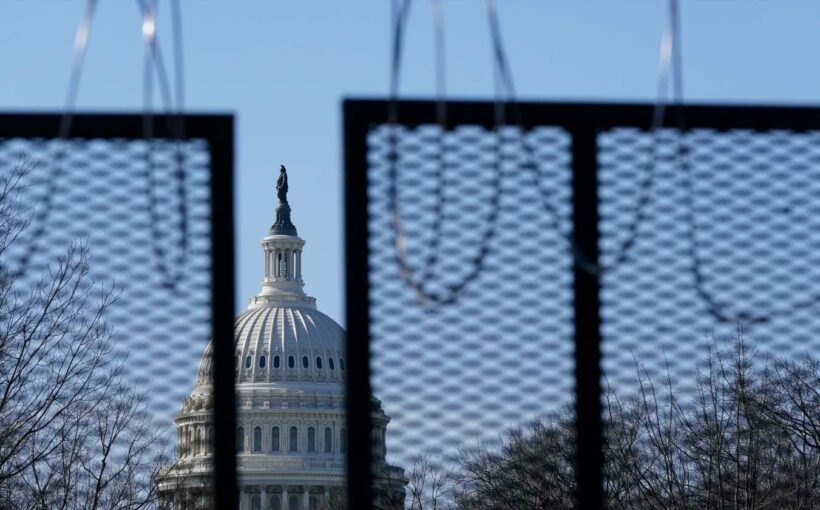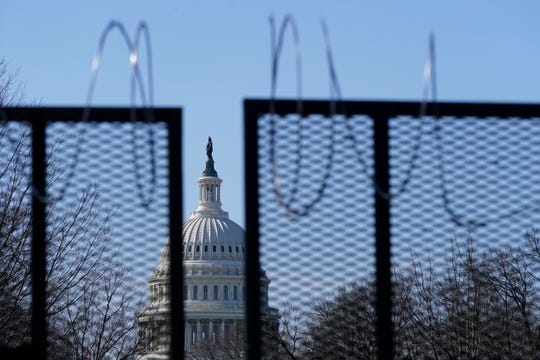WASHINGTON – The inspector general for U.S. Capitol Police told lawmakers Monday that pipe bombs planted at political party headquarters diverted officers from the Jan. 6 riot and he repeated a call for more staffing, as threats against lawmakers have “exploded.”
Rep. Jamie Raskin, D-Md., asked inspector general Michael Bolton at a House Administration Committee hearing whether the department needed more counter-surveillance officers. Raskin noted that six of 13 counter-surveillance officers were diverted to investigate pipe bombs at the Republican and Democratic national committees on Jan. 6.
“If those pipe bombs were intended to be a diversion, plainly speaking, it worked,” Bolton said.
Threats against lawmakers have more than doubled, compared to last year, according to Bolton. Threats increased steadily since 2017 and staffing levels were “some of the greatest challenges” for assessing threats, he said. A previous report urged greater staffing to assess threats, he said.
“Since that report, their caseload has basically exploded,” Bolton said.
The report on Capitol Police was Bolton’s third since the riot, fueling a legislative review aimed at deciding how much more security to post around Capitol Hill and how it should be distributed. The House committee will hold another hearing Wednesday with the inspector general for the Architect of the Capitol, the office that manages the buildings and grounds.
Bolton’s next review, expected in June, will focus on police command and control during the riot because of reports that radio communications between supervisors and officers in the field were confusing at the height of the violence.
The riot interrupted Congress’ counting of Electoral College votes showing President Joe Biden won the election. Five people died and 140 officers were injured during the attack.
The top Republican on the panel, Rep. Rodney Davis of Illinois, said he had received numerous threats, including one that led to a successful prosecution for threatening his life. But Davis said while threats increased 107% during the last year, arrests and indictments held steady.
“I know firsthand that these threats are real,” Davis said. “I believe in a more aggressive enforcement stance.”
FILE – In this March 20, 2021, file photo the U.S. Capitol dome stands past partially-removed razor wire hanging from a security fence on Capitol Hill in Washington. Authorities suggested for weeks in court hearings and papers that members of the Oath Keepers militia group planned their attack on the Capitol in advance in an effort to block the peaceful transition of power. But prosecutors have since said it’s not clear whether the group was targeting the Capitol before Jan. 6, giving defense attorneys an opening to try to sow doubt in the government’s case. (AP Photo/Patrick Semansky, File) ORG XMIT: WX106 (Photo: Patrick Semansky, AP)
Bolton’s latest report, which was delivered to lawmakers April 30, focused on staffing for counter-surveillance and threat assessment. He told lawmakers that the department’s deficiencies included vague guidance to officers.
The committee chair, Rep. Zoe Lofgren, D-Calif., quoted a police officer who said other officers were assigned to patrol parking garages on Jan. 6, which seemed to suggest a disconnect about the threat of the growing crowd.
“We need to make sure the threat assessments and the planning and the preparation were adequate for the event that was to present this huge challenge to our country,” Lofgren said.
Raskin asked whether more intelligence analysts were needed, from the current ratio of 30 officers to one analyst.
Bolton said other federal agencies have a ratio of five officers to each analyst, which are relied upon to conduct initial background checks on suspects.
“It’s not even close to other federal agencies,” Bolton said. “Those analysts are very important.”
Bolton recommended that Capitol Police set up a stand-alone entity dedicated to counter-surveillance, in an effort to identify and disrupt illegal activity aimed at lawmakers and staffers.
“The entity should be sufficiently staffed to accomplish its mission and have adequate resources, including dedicated analyst support and a central desk to exploit, investigate, disseminate and triage information in real time,” Bolton said.
Lawmakers are also debating contentious security strategies, such as how much fencing to have around the building.
A task force led by retired Lt. Gen. Russel Honoré reviewed Capitol security at the request of House Speaker Nancy Pelosi, D-Calif., and recommended hiring 854 more Capitol Police officers to the force of about 2,000. His goal was to reduce overtime and bolster intelligence gathering.
Source: Read Full Article

